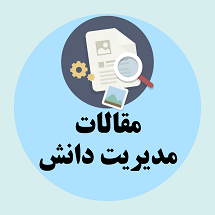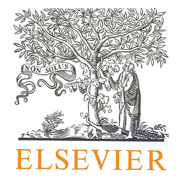دانلود ترجمه مقاله تاثیر رهبری دانش محور بر رفتار مدیریت دانش
| عنوان فارسی |
تاثیر رهبری دانش محور بر رفتار مدیریت دانش از طریق نگرش های شغلی کارکنان |
| عنوان انگلیسی |
Impact of knowledge oriented leadership on knowledge management behaviour through employee work attitudes |
| کلمات کلیدی : |
مدیریت دانش (KM)؛ رهبری دانش محور (KOL)؛ نگرش شغلی کارکنان؛ تعهد موثر؛ خودکارآمدی اخلاقی؛ مشارکت شغلی |
| درسهای مرتبط | مدیریت دانش |
| تعداد صفحات مقاله انگلیسی : 32 | نشریه : Taylor & Francis |
| سال انتشار : 2017 | تعداد رفرنس مقاله : 120 |
| فرمت مقاله انگلیسی : PDF | نوع مقاله : ISI |
|
پاورپوینت :
ندارد سفارش پاورپوینت این مقاله |
وضعیت ترجمه مقاله : انجام نشده است. |
1. مقدمه 2. چارچوب نظری و فرضیات 3. روش تحقیق 4. نتایج 5. بحث و بررسی و نتیجه گیری

چکیده – علیرغم درک اهمیت «مدیریت دانش» (KM)، بسیاری از کارکنان از اجرای KM در سطح فردی اجتناب می کنند. این اجتناب اغلب باعث از دست رفتن سرمایه فکری بخاطر ترک کار توسط کارکنان می شود. بسیاری از راهکارهای رفتاری بالقوه هنوز در مجموعه مقالات انجام شده، دست نخورده باقی مانده اند. این مطالعه، سازه «رهبری دانش محور» (KOL) را گسترش می دهد و نقش آن در پیش بینی رفتار KM در کارکنان بخش هتلداری را در سطح فردی، مورد بررسی قرار می دهد. همچنین، اثر میانجیگر نگرش های شغلی کارکنان، شامل تعهد عاطفی، خودتوانی خلاق و مشارکت شغلی را با استفاده از حداقل مربعات جزئی برای مدل سازی معادله ساختاری، مورد بررسی قرار می دهد. نگرش های شغلی (تعهد عاطفی، خودتوانی خلاق، مشارکت شغلی) میانجی رابطه KOL و رفتار KM هستند. علاوه بر آن، اثر مثبت مستقیم تعهد هیجانی کارکنان، خودتوانی خلاق و مشارکت شغلی بر رفتار KM نیز معنادار است. این مطالعه با تعمیم سازه KOL، و با بررسی ارتباط بین KOL، نگرش های شغلی و رفتار KM بین کارکنان هتلداری، در سطح فردی، در این مجموعه مقالات مشارکت می کند. مقدمه: هنگامی که کارکنان سازمان را ترک می کنند یا به بخش های اداری دیگر منتقل می شوند، دانش و استعدادشان نیز با آنها می رود. اگر این کارکنان، دانش خود را با انتقال و ذخیره آن در حافظه سازمانی، به دانش سازمانی تبدیل نکنند، بنابراین شرایط خروج و ترک کار کارکنان می تواند باعث از بین رفتن سرمایه انسانی شود. به این دلیل است که تبدیل دانش کارکنان به دانش سازمانی واقعاً مهم است و به این صورت، دانش کارکنان رمزگشایی می شود و به دارایی فکری سازمان ها تبدیل می شود (یانگ، 2004). بخصوص در بخش هتلداری، که با مسئله تعداد خروج و ورود زیاد کارکنان مواجه است، حفظ دانش کارکنانی که بیرون می روند، مهمتر می شود. پژوهشگران عرصه هتلداری تاکید می کنند که این کار را می توان با ترویج «مدیریت دانش» (KM) میان کارکنان در سطح فردی انجام داد (کیم و لی، 2013؛ یانگ، 2004). KM، فرآیند خلق، اکتساب، انتقال، مستندسازی/ذخیره و بکارگیری دانش است (نوناکا و تاکیوچی، 1995؛ راولی، 2000) و این را می توان در هر دو سطح فردی و سازمانی اجرا نمود (باک و کیم، 2002؛ یانگ و وان، 2004). این مطالعه از اصطلاح رفتار KM برای فعالیت های خلق، اشتراک گذاری، ذخیره و بکارگیری دانش در سطح فردی استفاده می کند.
Despite the acknowledged importance of knowledge management (KM), many employees avoid practicing KM at the individual level. This avoidance often leads to loss of the intellectual capital due to employee turnover. Many potential behavioural remedies are still untapped in the existing literature. This study extends the construct of knowledge oriented leadership (KOL) and examines its role in predicting KM behaviour among employees of the hospitality sector, at the individual level. It also investigates the mediating effect of employee work attitudes including affective commitment, creative self-efficacy and work engagement, by using partial least square for structure equation modelling. This study finds that KOL positively affects KM behaviour, affective commitment, creative self-efficacy and employee work engagement. Work attitudes (affective commitment, creative self-efficacy, work engagement) mediate the relationship of KOL and KM behaviour. Furthermore the direct positive effect of employee affective commitment, creative self-efficacy and work engagement on KM behaviour is also significant. This study contributes to the body of knowledge by extending the construct of KOL, and by investigating the connection between KOL, work attitudes, and KM behaviour among hospitality employees, at the individual level. Introduction: When employees leave the organization, or transfer to other departments, their knowledge and talent also go with them. If these employees do not convert their knowledge into organizational knowledge i.e. by transferring, and storing it in organizational memory, then in the circumstances of employee turnover organizations can face loss of human capital. That’s why, it is really important to transform the knowledge of employees into organizational knowledge, in this way knowledge of the employees would be decoded into the intellectual asset of the organizations (Yang, 2004). Particularly in the hospitality sector, which faces the problem of high employee turnover it becomes more important to retain the knowledge of outgoing employees. Hospitality researchers emphasize that it can be done by promoting knowledge management (KM) among employees at the individual level (Kim & Lee, 2013; Yang, 2004). KM is a process of creating, acquiring, transferring, documenting/storing and applying the knowledge (Nonaka & Takeuchi, 1995; Rowley, 2000), and it can be practiced at both individual and organizational levels (Bock & Kim, 2002; Yang & Wan, 2004). This study uses the term KM behaviour for the activities of creation, sharing, storage and applying the knowledge at the individual level.





دیدگاهها
هیچ دیدگاهی برای این محصول نوشته نشده است.